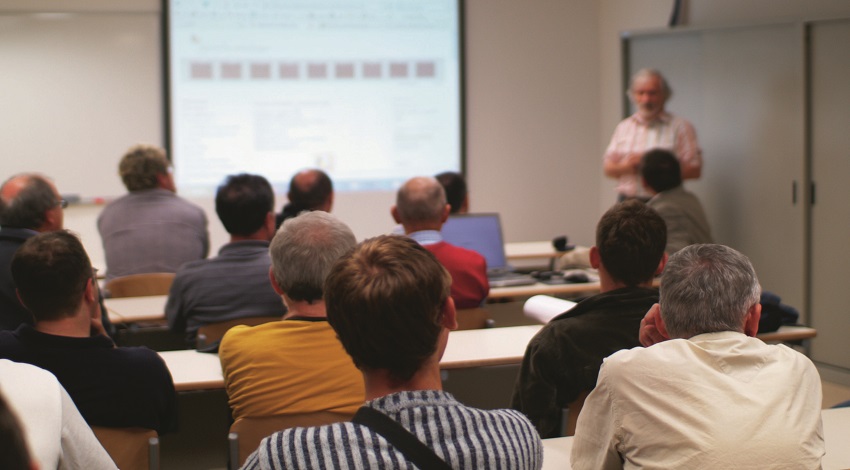Back to the Future: It’s never too late to go back to school
Why Road Scholars are returning to the classroom
We recently reached out to Road Scholars on Facebook to ask, “What would you study if you were to go back to school?” There was a collective resolve: it's never too late to return to the classroom of life. Learning knows no bounds — or age!

Responses varied from environmental studies to theater. One Road Scholar shared: “I read a lot of non-fiction because I think it is so important to keep studying and learning.”
This is my story about how four decades after three kids, three grandkids and a full-time career as a journalist and writer, I was inspired to head back to school to purse a master’s degree.
Thanks to the fact that I’m healthy and have remained active physically and mentally, I have great expectations to remain active, engaged and learning. I walk at least four miles every day, recently traded in my tennis racket for a pickle ball paddle, am a member of two book clubs, volunteer at the local food bank and am addicted to Farmer’s Markets, writing workshops, friendship and family get-togethers and any opportunities to explore the world.
As a former journalist and not-for-profit writer and mom of three adult children and three active grandkids, I’ve been blessed with a purposeful life and career. I’ve experienced many of my personal dreams. I’m not suggesting a Pollyanna story. Struggle and heartbreak also have been woven into the joy that has gone into my six-plus decades of living. Divorce. Newspaper lay-offs. The helplessness of caring for both my parents and aunt during serious illness and ultimately to the end of their lives.
Right about the time Medicare started pelting me with mailings, I found an inner voice tugging at my heart and soul. It was a longing for me to rescue a 40-year postponed dream to study in New York City. Somehow I’d buried it and it was suffocating in my inner sock drawer. My kids had flown the nest, my grandkids were quickly transitioning to gymnastics and baseball and “Nana adventures” to the Shedd Aquarium and the zoo were harder to pull off. The universe was nudging me. I found myself pleading: “Ok, I’m good to go. Could a guide with a roadmap appear and help me out here?”
On a beautiful fall afternoon in October of 2018, I found myself standing outside Pulitzer Hall on the quad of Columbia University, tucked into the heart of my happy place: New York City. I was there with my brother and sister-in-law for parent’s weekend. My very smart nephew Michael was a freshman. I jumped at the opportunity to make the weekend trek and explore Manhattan.

The “guide” appeared. It’s not exaggerating to say I was spellbound when information about a grad program somehow crossed my path. “Narrative Medicine” is a program born in the medical school, but which has grown to include doctors, nurses, scientists, writers, social workers, actors, and anyone who wants to be a better observer of human nature and storyteller. The practice teaches learners to listen closely to and elevate the voices of not only patients, caregivers and providers, but vulnerable populations like the aging and seriously ill, the oppressed, and others impacted by social justice inequities (and how that relates back to their physical, emotional and mental well-being).
Through my experience with my parents, I knew firsthand the nuanced, complicated challenges faced by people as we age. Turns out the practice of Narrative Medicine creates a safe space to explore, share and closely understand the impact of universal human experiences through a new lens — close and generous listening, authentic storytelling and reflective lived experiences. This happens when people closely read a short text (or listen to music or gaze at artwork) together, write together and listen together. If I was understanding the gist correctly, Narrative Medicine was exactly the training I needed to leverage the voices of our aging population, to create awareness of our challenges and to inspire change.
I had no clue where or how this was going to shape into a career shift. But I sensed deeply that the program would arm me with the tools to have deeper conversations, empathetic understanding of people’s stories and spark meaningful discussions with the goal to connect and change lives. But study in NYC? How was I going to pull that off?
COVID opened up the opportunity for online learning. I was accepted into the program in the spring of 2020. I enrolled in Narrative Medicine at Columbia the summer of 2020. Aside from several weekend workshops on the Columbia campus, I studied, connected with teachers and classmates from around the globe, all on ZOOM.

I have been a delighted and diligent student on a journey I never could have dreamed existed. From Sunday night at 10 p.m. Eastern time, when the new modules are posted online, to the following Sunday morning when they close, I have planted myself at my dining room table and devoured the learnings. It’s safe to say I have never studied so hard in my life. I would add that I became obsessed with earning straight A-pluses. The tuition wasn’t cheap, and the opportunity to study in-depth literature, the arts, and music was a gift! I was determined to thrive.
I’ve spent many Saturday afternoons in workshops with doctors and writers, social workers and others from across the world and developed deep and trusted friendships with amazing human beings who care so passionately about helping others.
Around every corner, my Narrative Medicine journey is offering me new opportunities. Here, I find myself on the pages of Road Scholar, chronicling the experiences of other lifelong learners and connecting with people striving to live full, healthy lives.
If you’re a lifelong learner looking for your next learning adventure, check out our Road Scholar educational adventures at www.roadscholar.org.
